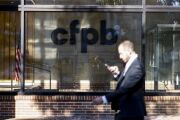
A Texas judge has recused himself from a case challenging the Consumer Financial Protection Bureau's $8 credit card late fee rule.
On Thursday, U.S. District Judge Reed O'Connor recused himself from the case in which the U.S. Chamber of Commerce and five other trade groups are seeking to halt the late fee rule from going into effect.
The CFPB has accused the trade groups of "
Judge Mark T. Pittman, a Trump appointee, replaced Judge O'Connor, and is expected to decide soon whether to grant the trade groups a preliminary injunction to keep the late fee rule from going into effect. Pittman has ruled against the Biden administration in several major cases, most recently in finding
The litigation over
The Supreme Court is
On Thursday, the CFPB argued that one of the trade groups, the Fort Worth Chamber of Commerce, lacked standing. The bureau said the case should be moved from Texas to the District of Columbia, where most of the trade groups and the CFPB are headquartered. In rebuttal, the U.S. Chamber said in its motions Thursday that many credit card issuers have customers in Fort Worth who would be adversely affected by the $8 late fee rule.
"The rule harms their ability to offer credit to Fort Worth consumers on favorable terms, and their ability to offer such credit directly affects the region's business climate," the Chamber said in a brief. "The Fort Worth Chamber's members do include directly-affected large card issuers," adding that its member directory "lists several branches of some of the country's largest card issuers."
Small credit card issuers will face competitive pressure to reduce their late fees in line with their larger competitors, the Chamber said, if the rule goes into effect.
Though Congress gave the CFPB broad authority under the Credit Card Accountability Responsibility and Disclosure Act, of 2009, the trade groups claim the CARD Act permits credit card issuers to impose a "penalty fee." They say Congress intended the penalty to be set above the cost of compensation and should be high enough to deter defaults.






